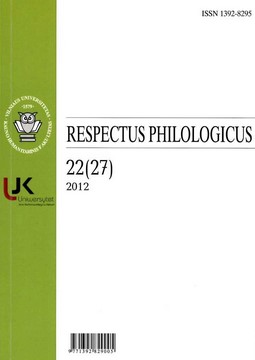LIETUVIŠKOS SOCIALINĖS REKLAMOS RETORIKA: ĮTIKINIMO BŪDAI
RHETORIC OF LITHUANIAN SOCIAL ADVERTISING: THE WAYS TO PERSUADE
Author(s): Skirmantė BiržietienėSubject(s): Logic, Ethics / Practical Philosophy, Marketing / Advertising, Business Ethics, Rhetoric
Published by: Vilniaus Universiteto Leidykla
Keywords: social advertising; rhetoric; argumentation; persuasion; ethos; logos; pathos arguments;
Summary/Abstract: The article deals with the rhetoric of advertising, specifically with the means employed to persuade the audience in Lithuanian social advertising. Aristotle in his Rhetoric points out that persuasion can be achieved in three ways: through ethos, logos, and pathos. Ethos refers to the speaker’s character as it appears to the audience: if we believe that a speaker has good sense, good morality and goodwill, we are inclined to believe what he says. In social advertising, famous people, organizations and authorities who are recognizable to the audience stand for this ethos argument. Logos means logical arguments. In our society, rationality is highly valued and this way of persuasion is rated as the best, but scientific reasoning in social advertising is not as persuasive as it might appear. Of course it is a strong additional argument to the more rhetorical types of reasoning. Pathos in Aristotle’s sense means the emotions of the audience. Usually people think that they make their decisions based on rational thought, but Aristotle points out that emotions such as pity, anger, fear and their opposites influence our judgments as well. In social advertising, the employment of the pathos argument is the most powerful and persuasive strategy. In this research, some different Lithuanian social campaigns and advertisements are analysed in order to define what methods were chosen to persuade the audience in every campaign and what types of arguments were dominant. It appears that the most persuasive advertising employs a combination of all arguments: ethos, logos, and pathos. However, persuasion in social advertising is based mostly on the pathos argument, because this type of advertising appeals to the emotions.
Journal: Respectus Philologicus
- Issue Year: 2012
- Issue No: 22(27)
- Page Range: 144-155
- Page Count: 12
- Language: Lithuanian

